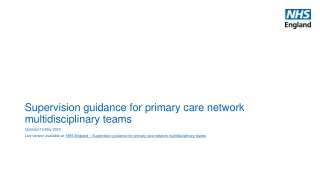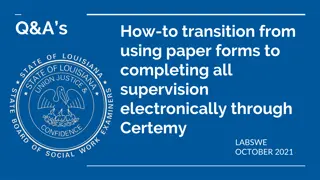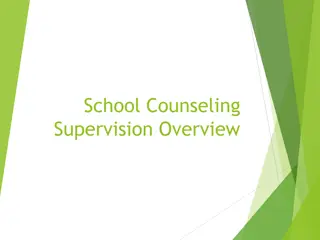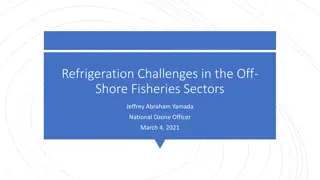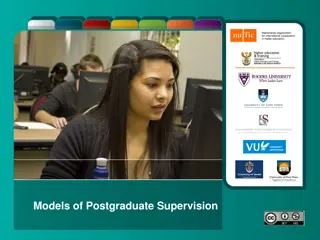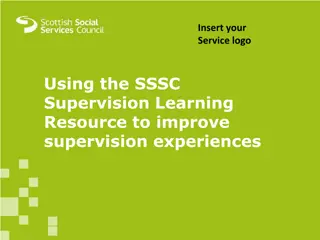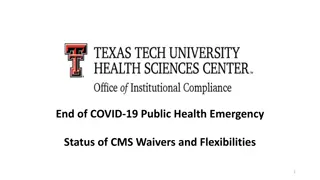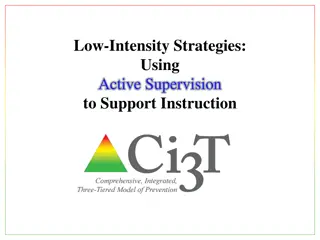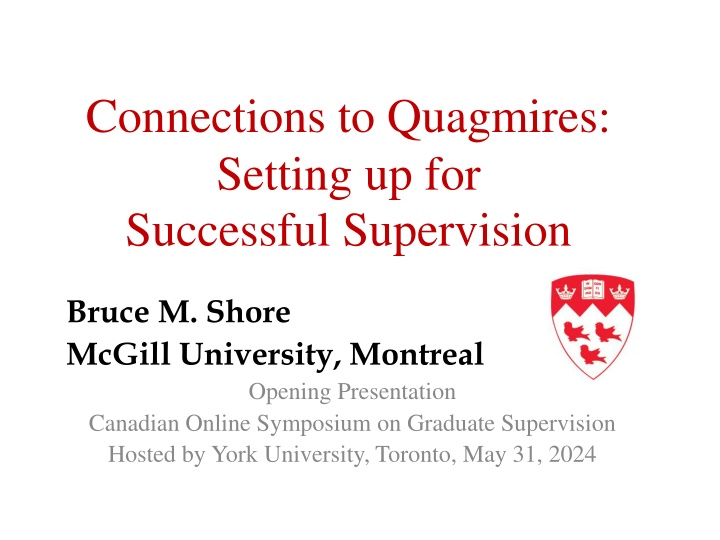
Successful Graduate Supervision Strategies for Research Advisors and Students
Discover effective strategies for successful graduate supervision, emphasizing the crucial advisor-student relationship, student-centered advising approach, and key topics such as maintaining boundaries and career support. Get insights on beginning the advisory relationship, student autonomy, financial support, and more to enhance your supervision experience.
Download Presentation

Please find below an Image/Link to download the presentation.
The content on the website is provided AS IS for your information and personal use only. It may not be sold, licensed, or shared on other websites without obtaining consent from the author. If you encounter any issues during the download, it is possible that the publisher has removed the file from their server.
You are allowed to download the files provided on this website for personal or commercial use, subject to the condition that they are used lawfully. All files are the property of their respective owners.
The content on the website is provided AS IS for your information and personal use only. It may not be sold, licensed, or shared on other websites without obtaining consent from the author.
E N D
Presentation Transcript
Connections to Quagmires: Setting up for Successful Supervision Bruce M. Shore McGill University, Montreal Opening Presentation Canadian Online Symposium on Graduate Supervision Hosted by York University, Toronto, May 31, 2024
Outline I Overview II Some Examples in More Detail III Discussion / Q&A
I Overview
An important part of the success and enjoyment of being a research advisor or supervisor, and being a research student, is the personal relationship between the advisor and the student.
What is Student-Centered Advising? Keeping the needs of the student as a person as well as an emerging scholar at the forefront of every decision from admissions to graduation and possible later collaboration.
Range of General Topics 1. Beginning the Advisory Relationship 2. Student-Centered Advising 3. Maintaining Boundaries (Routine Events) 4. Quagmires and Sticky Situations 5. Career Support 6. Institutionalizing the Culture
Specific Topics / 1 Beginning the Advisory Relationship - Working from Strengths - Advising Takes Different Forms - Making the Commitment (we will revisit the topics in blue in detail)
Specific Topics / 2 Student-Centered Advising - Building Autonomy - Financial Support - Sensitivity to Changes in Student Needs - Academic Integrity (for Supervisors!!) - Time Counts (maximum 2 weeks) - Scaffolding and Self-Monitoring Progress
Specific Topics / 3 Maintaining Boundaries - Distinguishing Work and Home - Maintaining Balance - Cultural Sensitivity - Socializing at Home - Socializing in Academic Settings - Physical Contact (Obtain Permission!) - Hard News - Life Coaching
Specific Topics / 4 Quagmires and Sticky Situations - Advisor versus Advisor - Refugees and Wanderers - Conflicts and Rivalry among Advisees - Procrastination and Delays - Disclosures (Consider Need to Know) - Conflicts of Interest - Sex . . . not just to get your attention!!!
< Sidenote > Heather McGhee Peggs, in the next presentation, will address conflict resolution and exiting difficult supervision situations, . . . therefore, I am focusing more on avoiding such pitfalls.
Specific Topics / 5 Career Support - Beyond the Fixed Curriculum - Reference Letters - Publishing Together - Mentoring
Specific Topics / 6 Institutionalizing a Culture of Student-Centered Advising (e.g., recognition, conversations, annual reporting, professional development) . . . also Supervision Contracts Student-Centered Advising Checklist
II Some Examples in More Detail
Examples with Some Details 5 of the 25 Advising Takes Different Forms Academic Integrity Socializing Refugees and Wanderers Sex
Example 1 Advising Takes Different Forms and might differ from our own experiences Graduate Study Differs from Undergraduate Students Seek Different Kinds of Supervision for Different Reasons
Graduate Study is Different Undergraduate vs. Graduate Campus-based vs. Locally based in a department, institute, center, other unit, or program Many instructors vs. Very few instructors and one critical central contact--the research supervisor Variety of courses and topics (breadth) vs. High(er) degree of specialization (depth) Considerable independence and anonymity (especially at large universities) vs. Closely observed and evaluated Financial support more at the institutional level vs. Considerably more local financial dependence
Reasons beyond Specialization or Professional Preparation for Preferring a Particular Research Supervisor Some potential graduate students especially seek Pedigree (Recognized Expert) Patron ( Support my Idea ) Kindred Spirit (Person over Topic)
Example 2 Academic Integrity Cases (involving supervisors) - Scooped student contributions - Unauthorized and uncredited publication from dissertation results - Invited paper rejected without offer to revise - Grad student as TA or lecturer encounters cheating in a course; risks online retaliation - Challenged data collection (damage, privacy)
Example 3 Socializing at Home and in Academic Settings Socializing with role models is a valued part of entry into a new world of scholars and advanced professionals. However, if not navigated with care, it carries risks to reputations . . . and relationships . . . .
Socializing in Academic Settings Use public campus facilities, avoid the fact or appearance of favoritism among students; tell office staff where you will be At conferences: Network for students BUT . . . Book separate and nonadjacent rooms, meet in public places Invite colleagues to meals, do not linger at student-focused events
Socializing at Home Greatly valued by students! This builds a feeling of becoming a colleague. However . . . Set the starting and ending time Have a cohost present the whole time Do not be alone at home with one student Respect alcohol age laws; not usually missed Do not employ your students to serve or clean Invite significant others; be clear about whether or not children are welcome
Example 4 Refugees and Wanderers Do not act unilaterally with wandering students shopping for new supervisors and keep in mind that your own students could be shopping around
Related Serious Quagmires Do not involve students even indirectly in advisor-advisor rivalries and disputes Avoid taking sides, be and appear to be fair in addressing conflicts among one s own supervisees Be proactive and caring, help set attainable goals in the face of delays in general--and especially with regard to procrastination and perfectionism
Example 5 A VERY Serious Quagmire Sex
Dealing with a Mutual Attraction In general, have a life and find personal relationships elsewhere, especially not in one s own program Treat genuine romantic attractions as a conflict of interest: Disclose, recuse, mitigate (e.g., end any and all advisory and evaluative responsibilities) Power relationships are all unequal, even in a community of adults
Conclusion There are many dimensions to creating and sustaining student-centered supervision. Initiative and success rests in large part with supervisors whose personal histories might have been different.
III Discussion Comments Questions and Answers
Thank you! bruce.m.shore@mcgill.ca

